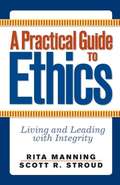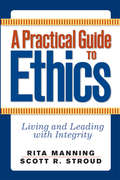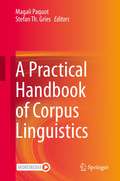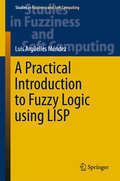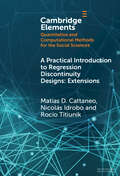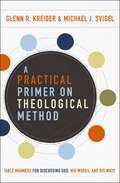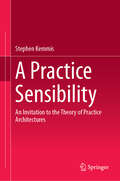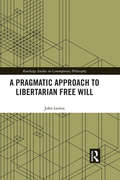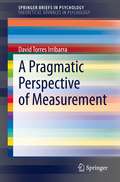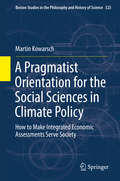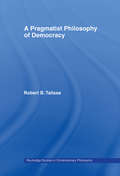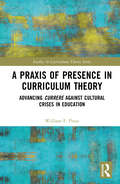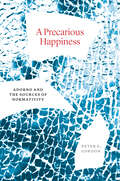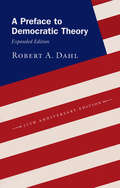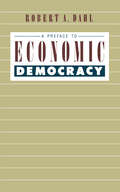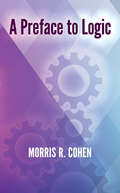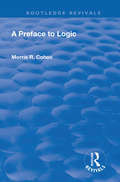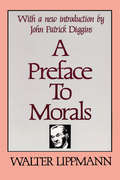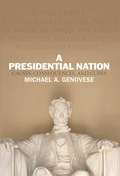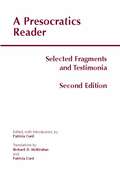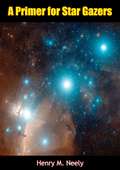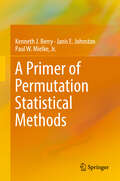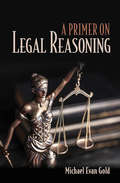- Table View
- List View
A Practical Guide to Ethics: Living and Leading with Integrity
by Scott R. Stroud Rita C. ManningThis essential new text is designed for courses in contemporary moral issues, applied ethics, and leadership. Emphasizing personal choice in the study of ethics, the authors take the reader on a journ
A Practical Guide to Ethics: Living and Leading with Integrity
by Rita ManningThis essential new text is designed for courses in contemporary moral issues, applied ethics, and leadership. Emphasizing personal choice in the study of ethics, the authors take the reader on a journey of self-discovery rather than a mere academic survey of the field of ethics. A Practical Guide to Ethics: Living and Leading with Integrity helps students develop their skills in ethical decision-making and put those decisions into effective practice. Its unique focus on leadership, especially the moral dimensions of understanding one's own values, teaches students to understand and, through dialog and negotiation, communicate their own beliefs as a step to building coalitions with those who may hold different views. It is also distinctive in combining ethical theory with both multicultural ethics (Confucianism, Hinduism, Islam, feminism) and a practical orientation to moral decision-making and leadership.
A Practical Handbook of Corpus Linguistics
by Stefan Th. Gries Magali PaquotThis handbook is a comprehensive practical resource on corpus linguistics. It features a range of basic and advanced approaches, methods and techniques in corpus linguistics, from corpus compilation principles to quantitative data analyses. The Handbook is organized in six Parts. Parts I to III feature chapters that discuss key issues and the know-how related to various topics around corpus design, methods and corpus types. Parts IV-V aim to offer a user-friendly introduction to the quantitative analysis of corpus data: for each statistical technique discussed, chapters provide a practical guide with R and come with supplementary online material. Part VI focuses on how to write a corpus linguistic paper and how to meta-analyze corpus linguistic research. The volume can serve as a course book as well as for individual study. It will be an essential reading for students of corpus linguistics as well as experienced researchers who want to expand their knowledge of the field.
A Practical Introduction to Fuzzy Logic using LISP (Studies in Fuzziness and Soft Computing #327)
by Luis Argüelles MendezThis book makes use of the LISP programming language to provide readers with the necessary background to understand and use fuzzy logic to solve simple to medium-complexity real-world problems. It introduces the basics of LISP required to use a Fuzzy LISP programming toolbox, which was specifically implemented by the author to "teach" the theory behind fuzzy logic and at the same time equip readers to use their newly-acquired knowledge to build fuzzy models of increasing complexity. The book fills an important gap in the literature, providing readers with a practice-oriented reference guide to fuzzy logic that offers more complexity than popular books yet is more accessible than other mathematical treatises on the topic. As such, students in first-year university courses with a basic tertiary mathematical background and no previous experience with programming should be able to easily follow the content. The book is intended for students and professionals in the fields of computer science and engineering, as well as disciplines including astronomy, biology, medicine and earth sciences. Software developers may also benefit from this book, which is intended as both an introductory textbook and self-study reference guide to fuzzy logic and its applications. The complete set of functions that make up the Fuzzy LISP programming toolbox can be downloaded from a companion book's website.
A Practical Introduction to Regression Discontinuity Designs: Extensions (Elements in Quantitative and Computational Methods for the Social Sciences)
by Matias D. Cattaneo Nicolas Idrobo Rocío TitiunikIn this Element, which continues our discussion in Foundations, the authors provide an accessible and practical guide for the analysis and interpretation of Regression Discontinuity (RD) designs that encourages the use of a common set of practices and facilitates the accumulation of RD-based empirical evidence. The focus is on extensions to the canonical sharp RD setup that we discussed in Foundations. The discussion covers (i) the local randomization framework for RD analysis, (ii) the fuzzy RD design where compliance with treatment is imperfect, (iii) RD designs with discrete scores, and (iv) and multi-dimensional RD designs.
A Practical Primer on Theological Method: Table Manners for Discussing God, His Works, and His Ways
by Glenn R. Kreider Michael J. SvigelA "how-to" manual for doing theology, and a handbook of etiquette for doctrinal discussions with other believers.Around a table sit men and women with distinct roles: The Interpreter, the Theologian, the Virtuous, the Philosopher, the Scientist, the Artist, the Minister, and the Historian. Each is ready to engage in a passionate discussion centered on God, his works, and his ways. Regardless of which role you play at the same table, you're invited. You simply need to pull up a chair and join the conversation. But how? What do you say when you take your seat? Where do you start? What are the "rules" of the dialogue?A Practical Primer on Theological Method will help you answer these questions. This primer is not only a "how-to" manual for doing theology, but a handbook of etiquette for doctrinal discussions with other believers. This popular-level introductory text presents the proper manner, mode, and means of engaging fruitfully in theology.
A Practice Sensibility: An Invitation to the Theory of Practice Architectures
by Stephen KemmisThis book introduces readers to the theory of practice architectures and conveys a way of approaching practice theory through developing a practice sensibility. It shows that, in order to change our practices, we must also change the conditions that make those practices possible. The book draws on everyday life to illustrate how we can see the world by watching it unfold in practices: it argues that life happens in practices. The theory of practice architectures takes the ontological nature of practices seriously by recognising that practices take place in the real world. Consequently, the book offers a new perspective on how practices happen amidst a vast world of happenings; on how we participate in the “happening-ness” of the world through our practices. It invites us to consider whether our practices reproduce or aggravate the contemporary environmental crises confronting the Earth, and whether we can transform our current practices to ameliorate these crises. Given its focus and scope, the book will benefit master’s and doctoral students in social and educational theory, early career researchers, and established researchers new to practice theory.
A Pragmatic Approach to Libertarian Free Will (Routledge Studies in Contemporary Philosophy)
by John LemosA Pragmatic Approach to Libertarian Free Will argues that the kind of free will required for moral responsibility and just desert is libertarian free will. It is a source of great controversy whether such a libertarian view is coherent and whether we should believe that we have such free will. This book explains and defends Robert Kane’s conception of libertarian free will while departing from it in certain key respects. It is argued that a suitably modified Kanean model of free will can be shown to be conceptually coherent. In addition, it is argued that while we lack sufficient epistemic grounds supporting belief in the existence of libertarian free will, we may still be justified in believing in it for moral reasons. As such, the book engages critically with the works of a growing number of philosophers who argue that we should jettison belief in the existence of desert-grounding free will and the practices of praise and blame and reward and punishment which it supports.
A Pragmatic Perspective of Measurement (SpringerBriefs in Psychology)
by David Torres IrribarraThis book aims to address the challenges of defining measurement in social sciences, presenting a conceptualization of the practice of measurement from the perspective of the pragmatic tradition in philosophy. The book reviews key questions regarding the scope and limits of measurement, emphasizing that if the trust that the public places on measures in the social sciences relies on their connection to the notion of measurement in the physical sciences, then the clarification of the similarities and differences between measurement in the physical and the social realms is of central importance to adequately contextualize their relative advantages and limitations. It goes on to present some of the most influential theories of measurement such as the “classical view” of measurement, operationalism, and the representational theory of measurement, as well as more methodological perspectives arising from the practice of researchers in the social sciences, such as the latent variable perspective, and from the physical sciences and engineering, represented by metrology. This overview illustrates that the concept of measurement, and that of quantitative methods, is currently being used across the board in ways that do not necessarily conform to traditional, classical definitions of measurement, pushing the boundaries of what constitutes our technical understanding of it. Moreover, what constitutes a technical understanding of measurement, and the theoretical commitments that it entails, must vary in different areas. In this context, disagreement on what is constitutive of measurement is bound to appear. Pragmatism is presented as a theoretical perspective that offers the advantage of being flexible and fallibilist, encouraging us to abandon the pursuit of a timeless and perfect definition that attempts to establish decontextualized/definitive demarcation criteria for what is truly measurement. This book will be of particular interest for psychologists and other human and social scientists, and more concretely for scholars interested in measurement and assessment in psychological and social measurement. The pragmatic perspective of measurement presents a conceptual framework for researchers to ground their assessment practices acknowledging and dealing with the challenges of social measurement.
A Pragmatist Orientation for the Social Sciences in Climate Policy: How to Make Integrated Economic Assessments Serve Society (Boston Studies in the Philosophy and History of Science #323)
by Martin KowarschThis book develops a new science-policy model for the Intergovernmental Panel on Climate Change (IPCC) and other socio-economic assessments of climate policy options. The work presented in this volume is systematically based on John Dewey's philosophy and inevitable fact/value entanglement in economics, and this work adds to current debates on science in policy. The model developed here could also promote deliberative democracy as an alternative to value dogmatism or procedural liberalism. The "Pragmatic Enlightened Model" presented here shows that experts should, in a participatory process, map the entire solution space by exploring alternative political pathways and their manifold practical consequences. This would allow a rational consideration even of controversial, value-laden policy goals through a comparative evaluation of their consequences, potentially requiring a revision of said values or goals. This book provides orientation for both assessment practitioners and their critical observers. Policymakers, stakeholders and public officials in the field of climate policy will find this work of interest, as will scholars from various disciplines, especially economics. Furthermore, researchers working on deliberative democracy, philosophy of economics, pragmatist meta-ethics, models of PPA (public policy analysis), STS (science and technology studies) with a focus on scientific policy advice, RIA (regulatory impact assessment), as well as the history of global environmental assessments, will find this work particularly valuable.
A Pragmatist Philosophy of Democracy (Routledge Studies in Contemporary Philosophy)
by Robert B. TalisseIn recent years there has been a renewed interest in American pragmatism. In political philosophy, the revival of pragmatism has led to a new appreciation for the democratic theory of John Dewey. In this book, Robert B. Talisse advances a series of pragmatic arguments against Deweyan democracy. Particularly, Talisse argues that Deweyan democracy cannot adequately recognize pluralism, the fact that intelligent, sincere, and well-intentioned persons can disagree sharply and reasonably over moral ideals. Drawing upon the epistemology of the founder of pragmatism, Charles S. Peirce, Talisse develops a conception of democracy that is anti-Deweyan but nonetheless pragmatist. Talisse then brings the Peircean view into critical conversation with contemporary developments in democratic theory, including deliberative democracy, Rawlsian political liberalism, and Richard Posner’s democratic realism. The result is a new pragmatist option in democratic theory.
A Praxis of Presence in Curriculum Theory: Advancing Currere against Cultural Crises in Education (Studies in Curriculum Theory Series)
by William F. PinarBuilding on his seminal methodological contribution to the field – currere – here William F. Pinar posits a praxis of presence as a unique form of individual engagement against current cultural crises in education. Bringing together a series of updated essays, articles, and new writings to form this comprehensive volume, Pinar first demonstrates how a praxis of presence furthers the study of curriculum as lived experience to overcome self-enclosure, restart lived and historical time, and understand technology through a process of regression, progression, analysis, and synthesis. Pinar then further illustrates how this practice can inform curricular responses to countering presentism, narcissism, and techno-utopianism in educators’ work with "digital natives." Ultimately, this book offers researchers, scholars, and teacher educators in the fields of curriculum theory, the sociology of education, and educational policy more broadly the analytical and methodological tools by which to advance their understanding of currere, and in doing so, allows them to tackle the main cultural issues that educators face today.
A Precarious Happiness: Adorno and the Sources of Normativity
by Peter E. GordonA strikingly original account of Theodor Adorno’s work as a critique animated by happiness. "Gordon’s confidently gripping and persistently subtle interpretation brings a new tone to the debate about Adorno’s negativism."—Jürgen Habermas Theodor Adorno is often portrayed as a totalizing negativist, a scowling contrarian who looked upon modern society with despair. Peter E. Gordon thinks we have this wrong: if Adorno is uncompromising in his critique, it is because he sees in modernity an unfulfilled possibility of human flourishing. In a damaged world, Gordon argues, all happiness is likewise damaged but not wholly absent. Through a comprehensive rereading of Adorno’s work, A Precarious Happiness recovers Adorno’s commitment to traces of happiness—fragments of the good amid the bad. Ultimately, Gordon argues that social criticism, while exposing falsehoods, must also cast a vision for an unrealized better world.
A Preface to Democratic Theory
by Robert A. Dahl“A Preface to Democratic Theory is well worth the devoted attention of anyone who cares about democracy.” —Political Science QuarterlyThis book by Robert Dahl helped launch democratic theory sixty years ago as a new area of study in political science, and it remains the standard introduction to the field. Exploring problems that had been left unsolved by traditional thought on democracy, Dahl here examines two influential models—the Madisonian, which represents prevailing American doctrine, and its recurring challenger, populist theory—arguing that they do not accurately portray how modern democracies operate. He then constructs a model more consistent with how contemporary democracies actually function, and, in doing so, develops some original views of popular sovereignty and the American constitutional system. For this edition, Dahl has written an extensive new afterword that reevaluates Madisonian theory in light of recent research. And in a new foreword, he reflects back on his influential volume and the ways his views have evolved since he wrote it. For any student or scholar of political science, this new material is an essential update on a gold standard in the evolving field of democratic theory.
A Preface to Economic Democracy (Quantum Books #28)
by Robert A. DahlTocqueville pessimistically predicted that liberty and equality would be incompatible ideas. Robert Dahl, author of the classic A Preface to Democratic Theory, explores this alleged conflict, particularly in modern American society where differences in ownership and control of corporate enterprises create inequalities in resources among Americans that in turn generate inequality among them as citizens.Arguing that Americans have misconceived the relation between democracy, private property, and the economic order, the author contends that we can achieve a society of real democracy and political equality without sacrificing liberty by extending democratic principles into the economic order. Although enterprise control by workers violates many conventional political and ideological assumptions of corporate capitalism as well as of state socialism. Dahl presents an empirically informed and philosophically acute defense of "workplace democracy." He argues, in the light of experiences here and abroad, that an economic system of worker-owned and worker-controlled enterprises could provide a much better foundation for democracy, political equality, and liberty than does our present system of corporate capitalism.
A Preface to Logic
by Morris R. CohenOver the past two centuries the field of logic has developed at an explosive pace into new areas far removed from the traditional syllogism and formal proof. The purpose of this well-known introductory treatment is to chart, clearly and lucidly, this new domain of today's vastly sophisticated logic. Author Morris R. Cohen explores "the periphery of logic, the relations of logic to the rest of the universe, the philosophical presuppositions which give logic its meaning, and the applications which give it importance."Beginning with an exploration of the traditional scope of logic as the medium of formal proofs, the text pursues a modern investigation of the relationship between logic and the mind, logic and speech, logic in metaphor and fiction-and most significantly, logic and the concept of abstract reasoning as applied to the empirical world. Additional topics include logic and statistical method, probability, and scientific models. Concise and highly readable, this volume is suitable for college undergraduates and other readers interested in logic. 1944 edition.
A Preface to Logic (Routledge Revivals)
by Morris R. CohenPublished in 1946, this volume does not purpose to be a treatise on logic. The author’s contributions to the substance of logical doctrine have been made in his other works. What he has attempted in the studies that form this volume is an exploration of the periphery of logic, the relation of logic to the rest of the universe, the philosophical presuppositions which give logic its meaning and the applications which give it importance. It is his belief that formal logic is the heart of philosophy, since the subject matter of logic is the formal aspect of all being. From this standpoint he explores the relation of logic to such fields of study as natural science, ethics, history and general philosophy.
A Preface to Morals
by Bernard J. ParisAfter an eloquent and moving analysis of what he sees as the disillusion of themodern age, Lippmann posits as the central dilemma of liberalism its inability to find an appropriate substitute for the older forms of authority-- church, state, class, family, law, custom--that it has denied. Lippmann attempts to find a way out of this chaos through the acceptance of a higher humanism and a way of life inspired by the ideal of -disinterestedness- in all things. In his new introduction to the Transaction edition, John Patrick Diggins marks A Preface to Morals, originally published in 1929, as a critical turning point in Lippmann's intellectual career. He also provides an excellent discussion of the enduring value of this major twentieth-century work by situating it within the context of other intellectual movements.
A Presidential Nation
by Michael A. GenoveseThe Washington Monument, the Lincoln Memorial, the Jefferson Memorial. Why do we devote monuments to the presidents? Why do we honor them, instead of Congress, or the courts?A Presidential Nationexamines how the presidency-an office limited by the Constitution and separation of powers-became the centerpiece of American government. Michael A. Genovese argues that in rebelling against the British, the Framers of the Constitution invented a circumscribed presidency to guard against executive tyranny. Yet, over time, presidential power has risen and congressional power declined to a point where the United States has a near imperial presidency. Reexamining the status of presidential power in the post-9/11 world, Dr. Genovese considers the alternatives, if any, to the current model of presidential power. A Presidential Nationis perfect for students of American Presidency and Federal Governance courses and anyone interested in the changing authority of the American political system.
A Presidential Nation
by Michael A. GenoveseThe Washington Monument, the Lincoln Memorial, the Jefferson Memorial. Why do we devote monuments to the presidents? Why do we honor them, instead of Congress, or the courts? A Presidential Nation examines how the presidency--an office limited by the Constitution and separation of powers--became the centerpiece of American government. Michael A. Genovese argues that in rebelling against the British, the Framers of the Constitution invented a circumscribed presidency to guard against executive tyranny. Yet, over time, presidential power has risen and congressional power declined to a point where the United States has a near imperial presidency. Reexamining the status of presidential power in the post-9/11 world, Dr. Genovese considers the alternatives, if any, to the current model of presidential power. A Presidential Nation is perfect for students of American Presidency and Federal Governance courses and anyone interested in the changing authority of the American political system.
A Presidential Nation
by Michael A. GenoveseThe Washington Monument, the Lincoln Memorial, the Jefferson Memorial. Why do we devote monuments to the presidents? Why do we honor them, instead of Congress, or the courts? A Presidential Nation examines how the presidency--an office limited by the Constitution and separation of powers--became the centerpiece of American government. Michael A. Genovese argues that in rebelling against the British, the Framers of the Constitution invented a circumscribed presidency to guard against executive tyranny. Yet, over time, presidential power has risen and congressional power declined to a point where the United States has a near imperial presidency. Reexamining the status of presidential power in the post-9/11 world, Dr. Genovese considers the alternatives, if any, to the current model of presidential power. A Presidential Nation is perfect for students of American Presidency and Federal Governance courses and anyone interested in the changing authority of the American political system.
A Presocratics Reader: Selected Fragments and Testimonia
by Richard D. Mckirahan Patricia CurdBuilding on the virtues that made the first edition of A Presocratics Reader the most widely used sourcebook for the study of the Presocratics and Sophists, the second edition offers even more value and a wider selection of fragments from these philosophical predecessors and contemporaries of Socrates.With revised introductions, annotations, suggestions for further reading, and more, the second edition draws on the wealth of new scholarship published on these fascinating thinkers over the past decade or more, a remarkably rich period in Presocratic studies.At the volume's core, as ever, are the fragments themselves--but now in thoroughly revised and, in some cases, new translations by Richard D. McKirahan and Patricia Curd, among them those of the recently published Derveni Papyrus.
A Primer for Star Gazers
by Henry M. NeelyA beginner’s book on astronomy, which should enable anyone to locate the various constellations. Primer for Star Gazers explains in simple pictures and directions, with brief consideration to fixed stars, the northern sky and the planets. It includes a star calendar.“This book is an effort to rescue the ancient love of simple star-gazing from the avalanche of mathematics and physics under which modern astronomy threatens to bury it.”—Henry M. Neely“For the absolute amateur, who does not want too scientific a study but does want to be able to recognize the principal stars and constellations”—Kirkus Review
A Primer of Permutation Statistical Methods
by Kenneth J. Berry Janis E. Johnston Paul W. Mielke, Jr.The primary purpose of this textbook is to introduce the reader to a wide variety of elementary permutation statistical methods. Permutation methods are optimal for small data sets and non-random samples, and are free of distributional assumptions. The book follows the conventional structure of most introductory books on statistical methods, and features chapters on central tendency and variability, one-sample tests, two-sample tests, matched-pairs tests, one-way fully-randomized analysis of variance, one-way randomized-blocks analysis of variance, simple regression and correlation, and the analysis of contingency tables. In addition, it introduces and describes a comparatively new permutation-based, chance-corrected measure of effect size. Because permutation tests and measures are distribution-free, do not assume normality, and do not rely on squared deviations among sample values, they are currently being applied in a wide variety of disciplines. This book presents permutation alternatives to existing classical statistics, and is intended as a textbook for undergraduate statistics courses or graduate courses in the natural, social, and physical sciences, while assuming only an elementary grasp of statistics.
A Primer on Legal Reasoning
by Michael Evan GoldAfter years of teaching law courses to undergraduate, graduate, and law students, Michael Evan Gold has come to believe that the traditional way of teaching – analysis, explanation, and example – is superior to the Socratic Method for students at the outset of their studies.In courses taught Socratically, even the most gifted students can struggle, and many others are lost in a fog for months. Gold offers a meta approach to teaching legal reasoning, bringing the process of argumentation to the fore.Using examples both from the law and from daily life, Gold's book will help undergraduates and first-year law students to understand legal discourse. The book analyzes and illustrates the principles of legal reasoning, such as logical deduction, analogies and distinctions, and application of law to fact, and even solves the mystery of how to spot an issue.In Gold's experience, students who understand the principles of analytical thinking are able to understand arguments, to evaluate and reply to them, and ultimately to construct sound arguments of their own.
